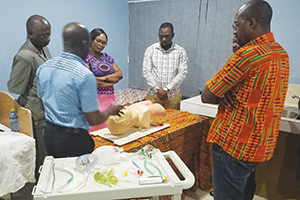By JULIE MINDA
CHA is helping to lead a coalition that is studying how health care providers can conduct more appropriate short-term medical missions overseas and how the efforts can be more respectful to the local culture and more responsive to in-country health needs.
Four international health experts are leading the effort, which is called the Coalition for Responsible Engagement in Short-Term Global Health. About 30 additional individuals support the work.

Dr. Paa Kobina Forson, second from left, and Henrietta Ntow, center, provide training to three anesthesiologists from Guinea in October 2018 at the Korle Bu Teaching Hospital in Accra, Ghana. Forson is an emergency specialist at Komfo Anokye Teaching Hospital in Kumasi, Ghana, and Ntow is an emergency nurse at that facility. According to a member of the Coalition for Responsible Engagement in Short-Term Global Health, this photo of in-county clinicians provide training to other clinicians within the same region illustrates an optimal approach to addressing health care gaps in countries with pronounced needs.
The coalition is coordinating overseas research on the effectiveness of medical missions, building relationships with the World Health Organization, organizing a symposium and developing a repository of resources. All activities are aimed at ensuring that medical providers' short-term medical missions are responding to the needs of host countries and people appropriately, and in the most beneficial way.
The leaders of the coalition are Bruce Compton, CHA senior director of international outreach; Myron Aldrink, chairman of the Medical and Surgical Skills Institute in Ghana; Judith Lasker, a sociology and anthropology professor at Lehigh University in Bethlehem, Pa.; and Dr. Shailey Prasad, executive director of the University of Minnesota School of Public Health in Minneapolis.
The four formed the coalition about two years ago to work together to identify ways that short-term medical missions can deliver medical and clinical services, training and products in a manner that optimizes the benefit to the host facility, organization or country.
For instance, medical professionals on short-term medical missions sometimes don't understand the local culture or health resources. There's not always attention to setting up follow-up care after the initial medical services are delivered. There may not be a focus on the sustainability of the work in a host country that likely lacks the infrastructure and financial resources to sustain short-term gains made by visiting medical professionals. And the high cost of short-term medical missions — travel costs alone can run in the many thousands of dollars — must be weighed against the resulting benefits. Money potentially could be better spent building up capacity for medical services in the host country.
The coalition says such aspects of aid should be thought through and addressed.
Coalition members want organizations that are conducting medical missions overseas to analyze their approaches from the perspectives of the recipient organizations and people, and to perhaps reconsider their care delivery models, given those perspectives.
To help organizations to do this, the coalition is:
- Working with in-country researchers in Ghana, Uganda and Guatemala to understand more clearly host countries' perspectives on medical missions. This includes extensive interviewing in communities that host short-term medical missions. The researchers will provide reports on their findings, and the coalition will use those reports to inform protocols on short-term health care delivery.
- Coordinating with WHO to advance what WHO calls "Twinning Partnerships for Improvement." Those are mutual partnerships of organizations that work together to respond to pressing health needs.
- Holding a symposium in May 2020 in Geneva, Switzerland, to develop a "global declaration" of principles for global health work. The symposium will bring together representatives of universities, health care systems, government agencies and other organizations involved in global health.
- Developing white papers and other publications exploring this topic.
- Creating an online library of those papers and other resources.
Information is available from Compton at [email protected], or Aldrink at [email protected].
Resources
For CHA resources on short-term medical missions, visit chausa.org/internationaloutreach/Overview. Click on "Medical, Mission & Immersion Trips" in the left-hand column.
Coalition sets out its guiding principles for medical missions
Core values of the Coalition for Responsible Engagement in Short-Term Global Health
- Empowered host country and community
- Humility cultural sensitivity and respect for all involved
- Mutual Partnership with bi-directional inputs and learning
- Compliance with applicable laws, ethical standards and codes of conduct
- Sustainable programs and capacity building
- Accountable for actions